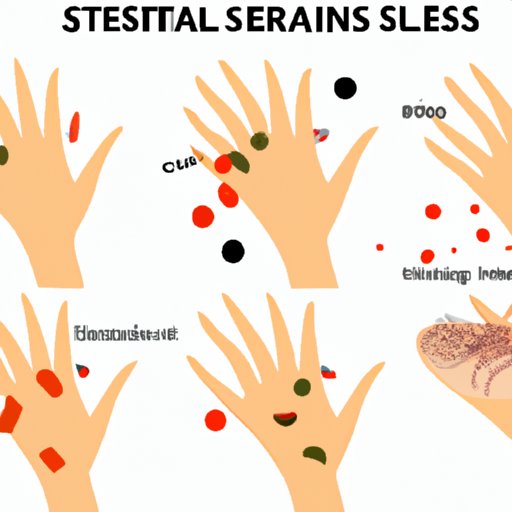
Introduction
Have you ever noticed a rash on your skin after a particularly stressful day? You are not alone. The relationship between stress and skin rashes is well-documented, but many people are unaware of the connection. The purpose of this article is to explore the link between stress and different types of skin rashes, helping readers understand why stress can cause skin problems and offering tips and tricks for identifying and treating stress-induced rashes.
The Surprising Relationship Between Stress and Skin Rash
Stress is the body’s response to a perceived threat or danger. It is a normal physiological response that helps us stay alert and focused, but chronic or excessive stress can have negative effects on the body. When you experience stress, your body releases various hormones, including cortisol and adrenaline. These hormones can cause a wide range of symptoms, such as headaches, sleep disturbances, and digestive problems. But did you know that stress can also manifest as a skin rash?
Studies show that stress-related rashes are surprisingly common. One survey found that 32% of respondents reported having a skin problem that was related to stress.
When Stress Comes Out on Your Skin: Understanding Stress-Related Rashes
There are several different types of rashes that can be caused by stress, including hives, eczema, and psoriasis. Hives, also known as urticaria, are red, itchy welts that can appear anywhere on the body. Eczema, or atopic dermatitis, is a chronic condition that causes red, itchy, and inflamed patches on the skin. Psoriasis is an autoimmune disorder that causes thick, scaly patches on the skin.
It is important to note that stress is not the only factor that can cause these types of rashes. Genetics, environmental factors, and allergies can all contribute to the development of skin problems. However, stress can exacerbate existing conditions or trigger new ones.
The Link Between Stress and Itching: A Deep Dive
One of the most common symptoms of stress-related rashes is itching. Stress can trigger or worsen itching by causing the body to release histamine, a chemical that causes inflammation and itching. When you are under stress, your body responds by producing histamine, which can cause or worsen itching.
To manage stress-induced itching, it is important to identify and address the underlying source of stress. This may involve adopting stress-reducing techniques, such as meditation or yoga, or making healthy lifestyle choices, such as eating a balanced diet and getting regular exercise. Additionally, topical creams or oral medications may be prescribed to alleviate itching in severe cases.
Stress Rash: Can Your Mind Really Affect Your Skin Health?
The link between stress and skin health is not just theoretical; it is supported by scientific research. Stress can affect skin health by altering hormone levels and immune system response. When you are under stress, your body releases cortisol, a hormone that regulates inflammation and immune function. Elevated cortisol levels can lead to inflammation and an overactive immune response, which can cause or worsen skin problems.
One study found that participants who reported high levels of stress had a 23% increased risk of developing eczema, an inflammatory skin condition that is commonly aggravated by stress.
The Effects of Stress on Skin: How to Identify and Treat Stress-Induced Rashes
If you suspect that your skin rash is related to stress, the first step is to identify and address the underlying source of stress. This may involve making healthy lifestyle choices, such as getting regular exercise, eating a balanced diet, and getting enough sleep. Additionally, stress-reducing techniques like mindfulness meditation, deep breathing, and yoga can help alleviate stress and improve skin health.
Depending on the type and severity of the rash, your healthcare provider may prescribe topical creams, oral medications, or other treatments to alleviate symptoms. It is important to follow your healthcare provider’s instructions carefully and to report any side effects or concerns.
Skin Deep: Exploring the Connection Between Mental Health and Dermatological Conditions
Mental health is closely linked to skin health. Stress, anxiety, and depression can all contribute to the development or exacerbation of skin problems. In fact, studies show that people with skin conditions are more likely to experience anxiety and depression than people without skin problems.
If you are struggling with stress-induced rashes or other skin conditions, it is important to seek support from a qualified healthcare provider. Your healthcare provider can help you identify the underlying cause of your symptoms and recommend appropriate treatments and interventions.
Conclusion
In conclusion, stress can have a significant impact on skin health. By understanding the link between stress and different types of skin rashes, you can take steps to alleviate stress and manage your symptoms. Whether you choose to adopt stress-reducing techniques or seek professional support, know that there are resources available to help you address your stress-induced rashes.
If you are struggling with a skin rash or other skin condition, do not hesitate to reach out to a qualified healthcare provider. With the right support and interventions, you can improve your skin health and overall well-being.




